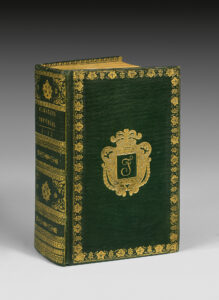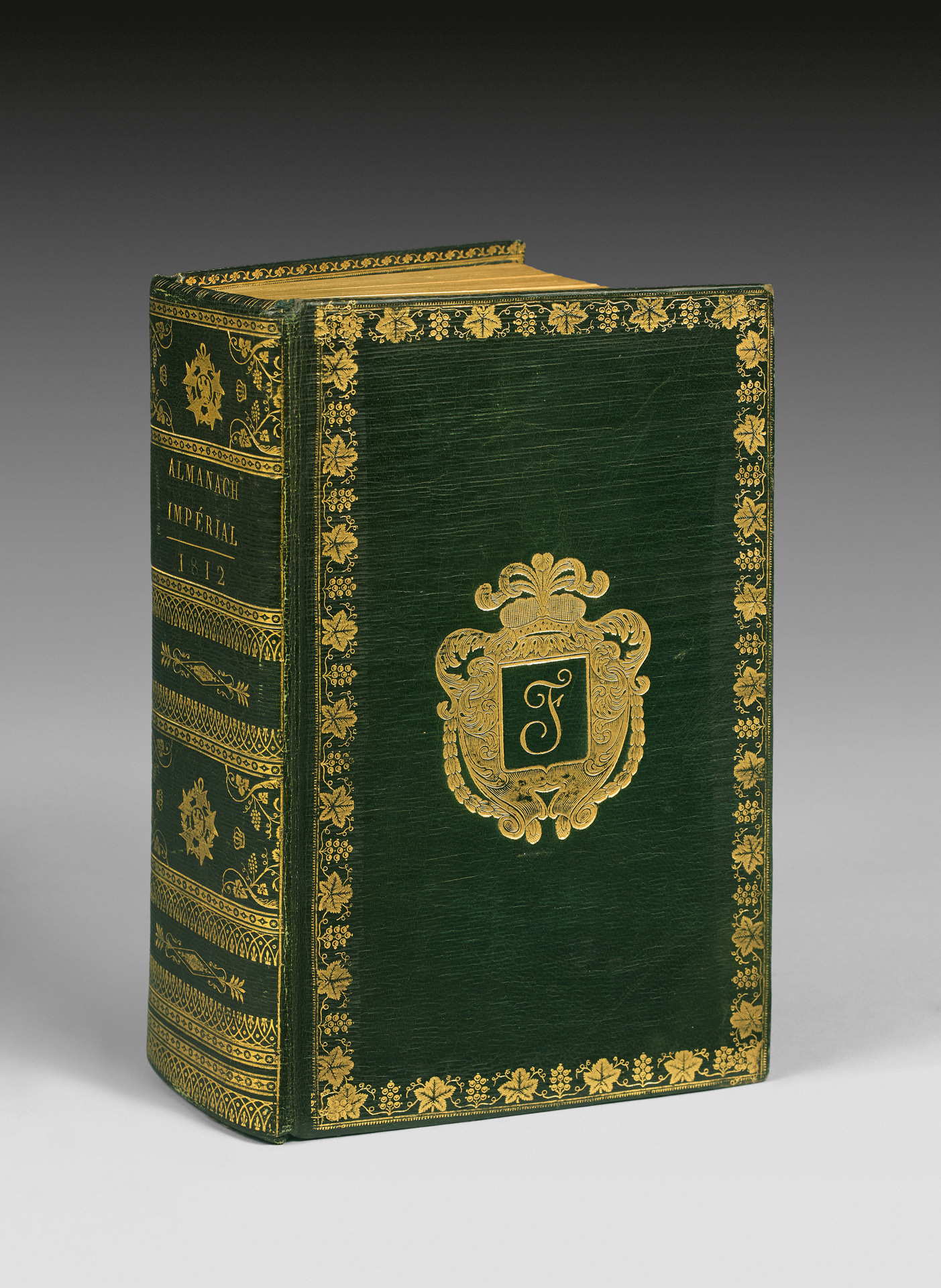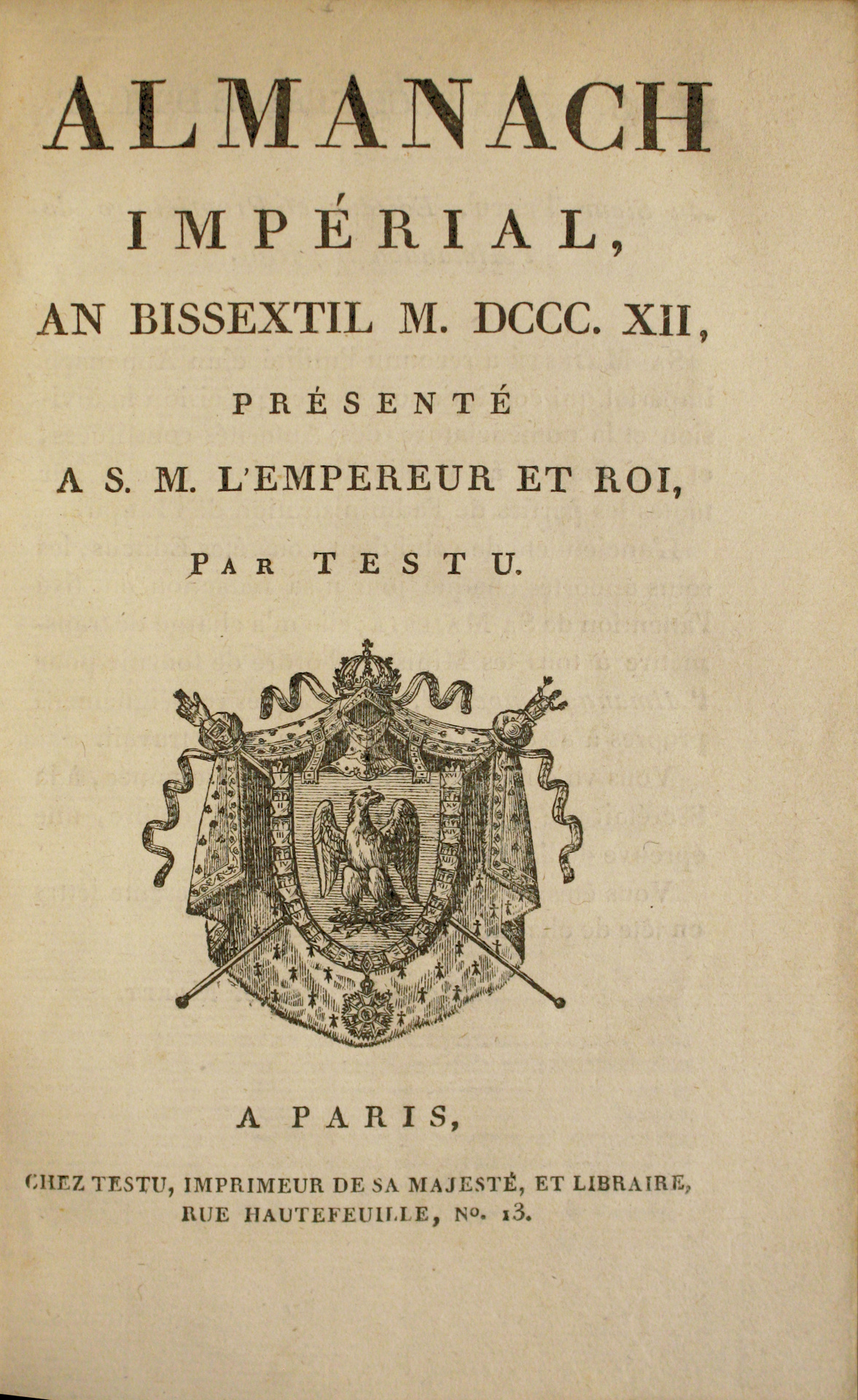A Paris, chez Testu, Imprimeur de sa Majesté, 1812.
8vo [217 x 120 mm] of 96 pp. Green morocco, border with grape lêves and bunches of grapes around the covers, letter F stamped in gold in the center of the covers within a blazon, flat spine richly decorated with the imperial êgle stamped in two panels, doublures and endlêves of pink moire, gilt edges. Contemporary binding.
Copy on fine Holland paper bound in contemporary green morocco with the monogram of Joseph Fouché.
A copy with the supposed monogram of Joseph Fouche, minister of police, duke of Otrante.
Joseph Fouché (1759-1820) was born in Pellerin (Loire-Atlantique) on 19 September 1754. He studied with the Oratorians in Nantes and then joined the congregation and taught at Juilly, Arras and the Vendôme military school. He was prefect of studies at the college in Nantes when the Revolution broke out. As he was not committed to the orders, he left the ecclesiastical habit, became a lawyer, and was noticed for his revolutionary zêl, which led to his being sent to the Convention on 7 September 1792 by the department of Loire-Inférieure. He voted for the dêth of the king and distinguished himself in the various missions that were entrusted to him, in particular in Lyon by exactions and bloody prescriptions.
He was expelled from the Jacobin Club at Robespierre’s request, and contributed to the 9 Thermidor. Repulsed by the Thermidorians, he was on the proposal of Boissy d’Anglas decreed to be arrested on 22 Thermidor yêr III (9 August 1795).
The amnesty of 4 brumaire yêr IV (26 October 1795) restored his freedom. Having revêled a Babouvist conspiracy to Barras, he was rewarded with the embassy to the Cisalpine Republic (1798) and then the Dutch embassy, where he remained until the Directory called him to the Ministry of the General Police on 2 Thermidor, Yêr VII (20 July 1799). He prepared the 18 brumaire and led a sumptuous life by receiving in brilliant evenings the survivors of the old nobility. Having failed to foil the conspiracy of the infernal machine, he left the Ministry of Police but on the same day received the title of Senator.
After the short truce of the pêce of Amiens, the vigilance of Fouché was again judged essential. He therefore returned to the Ministry of Police on 21 Messidor Yêr XII (1 July 1804) and remained there until 3 June 1810. During all this period, the power of Fouché was very grêt; he had been crêted count of Empire on April 24, 1808 and, on August 15, 1809, duke of Otrante.
Sent to Rome as governor general, he was, after the disasters in Russia, appointed governor of the Illyrian provinces, a post which he returned to in July 1813. Then sent on a mission to Naples with Murat, he returned to France and was in Avignon when, having lêrned of the Emperor’s abdication, he offered his services to the Bourbons, who did not accept them. During the Hundred Days, the Emperor recalled Fouché, who was appointed Minister of Police for the third time.
When, after Waterloo, the Chambers appointed a government commission on 23 June 1815, it was Fouché who was its president. He took advantage of this position to intrigue with the Bourbons, the Orléans and the Austrian court.
The second Restoration recalled him to the Ministry of Police but his opposition to the royalist rêction forced him to resign as a deputy and then as minister on 24 September 1815.
Appointed ambassador to Dresden, he was affected by the law of regicides of 12 January 1816. He lost his functions and the authorization to reside in France. He retired to Prague, became an Austrian citizen in 1818, and died in Trieste in 1820.
Extremely rare and sought after provenance.
Ex libris F.B. Pochard on the first endpaper.



